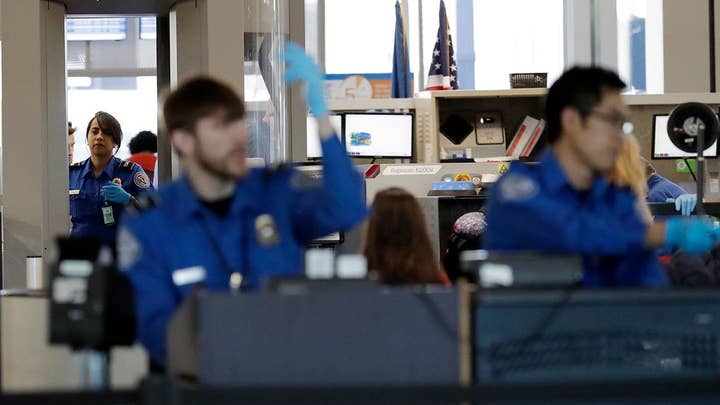Some TSA workers facing difficult choice: Find a job that will pay them or report to a job that won't
TSA reports many workers can no longer handle the financial hardship of working without pay as the partial government shutdown drags on; Laura Ingle reports.
The National Air Traffic Controllers Association (NATCA), along with the Air Line Pilots Association (ALPA) and the Association of Flight Attendants-CWA (AFA) said Wednesday they have “a growing concern” for staffers, crew members, airlines and airline passengers amid the ongoing partial government shutdown.
“This is already the longest government shutdown in the history of the United States and there is no end in sight,” the unions stated. “In our risk averse industry, we cannot even calculate the level of risk currently at play, nor predict the point at which the entire system will break.
“It is unprecedented,” they added in a press release.
The unions – which represent nearly 20,000 air traffic controllers, 61,000 pilots and just under 50,000 flight attendants – said the temporary shuttering of airport screening checkpoints is likely to continue.
“We are not confident that system-wide analyses of safety reporting data, which is used to identify and implement corrective actions in order to reduce risks and prevent accidents, is 100 percent operational due to reduced FAA resources.”
“Safety inspectors and federal cyber security staff are not back on the job at pre-shutdown levels, and those not on furlough are working without pay,” the unions wrote. “In addition, we are not confident that system-wide analyses of safety reporting data, which is used to identify and implement corrective actions in order to reduce risks and prevent accidents, is 100 percent operational due to reduced FAA resources.”
The group further claimed that staffing within air traffic control is at a 30-year low “and controllers are only able to maintain the system’s efficiency and capacity by working overtime, including 10-hour days and 6-day workweeks at many of our nation’s busiest facilities.”
The FAA also has frozen its hiring and training for new air traffic controllers, which the unions say will create a hiccup in staffing when the government finally reopens.
“As union leaders, we find it unconscionable that aviation professionals are being asked to work without pay and in an air safety environment that is deteriorating by the day. To avoid disruption to our aviation system, we urge Congress and the White House to take all necessary steps to end this shutdown immediately,” the group concluded its statement.
UNITED PASSENGER CLAIMS AIRLINE COVERED UP 'NEAR-DEATH' INCIDENT
A report out of Hawaii claimed that at least “some” employees working in Transportation Security Administration (TSA) in the state have turned in their resignations amid the ongoing partial government shutdown.
Sources for Hawaii News Now could not confirm how many people have resigned, but the outlet cites missed wages as the employees’ decisions to quit.
Others who spoke with the outlet now claim that some workers are foregoing their medications or medical appointments until they receive their paychecks, and at least one claimed to be living out of his van, parked just outside of his job, because he could not afford to commute.
“When I met with the TSA people the other day, they told us their stories and they’re crying because it’s so traumatic,” U.S. Sen. Mazie Hirono (D-Hawaii), was quoted as saying.
Hirono also called President Trump “amoral” for his stance on refusing to reopen the government unless his border security proposal is met, adding that he’s “negotiating from a hostage taking position.”
CLICK HERE TO GET THE FOX NEWS APP
The very same day of NACTA, ALPA and ACA’s announcement, the TSA confirmed in a news release that the rate of unscheduled absences among employees on Tuesday, Jan. 22, had more than doubled from the same date the previous year (7.4 percent vs. 3.2 percent). The TSA also reiterated that “many employees are reporting that they are not able to report to work due to financial limitations” — something the TSA has stated in recent news releases.
Despite this, the agency reported that “99.9 percent of passengers waited less than 30 minutes and 94.8 percent of passengers waited less than 15 minutes” to pass through security on Tuesday, while PreCheck passengers waited an average of less than 10. Those wait times fell well within the average of 30 minutes for regular screening, and 10 minutes for PreCheck passengers, according to the TSA.










































